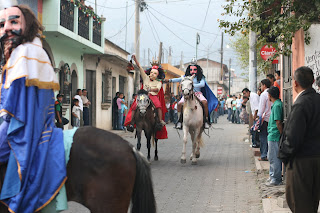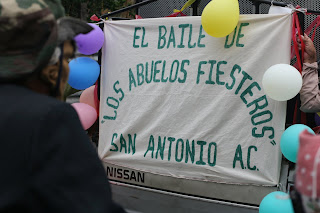Yesterday marked my one week anniversary with my host family. I have to say that everything is going a lot smoother, easier, and more comfortable than I had really imagined. I have only two things that I would change if I had the choice. One, I would like my guitar. Two, I would like a hot shower. But that’s about it.
The weather is a lot warmer after my first three nights so I’m not freezing anymore, and the days are all really warm, sunny, and very pleasurable. There is so much to do during the day that I’m never just sitting around being bored and that really makes the time fly by quickly. A typical day for me now
7:00 - Wake up, have breakfast, and tidy my room
8:00 - Spanish class
12:00 - Lunch
1:00 - Spanish class
3:00/4:00 - Work on project with my team or do some other activity with them
6:00/7:00 - Come home and talk with my family and usually help them cook dinner
7:00/8:00 - Eat dinner
9:30 - Head to my room to read, write, do homework, and eventually sleep.
That’s basically my Monday-Saturday, though on Saturdays we don’t have any Spanish class in the afternoon so there’s a little more free time.
Today, Sunday, I got to sleep in a little more, had breakfast with my family, then headed to the market with them. I worked with my group for an hour and a half or so and then had lunch with my family. After lunch, my group members and I went to the neighboring town (a 15 minute walk away from my house) and went swimming in their pool. The pools really neat, they are man-made but naturally fed by mountain spring water and there are three or four different pools all on different levels, because they were built on an incredibly steep slope. Also they had one waterslide. A straight shot down. This isn’t your average boring, slow, waterslide that you go down in an inner-tube. This is a straight shot down a rather steep grade, which forces water up your nose as you land in the water below. It is also rather shallow where you get spat out so I always ended up hitting my feet and back on the ground. I’m glad I did not go head first.
As we were walking to the pools, we also got invited to play a little basketball later with the host-brothers of one our group members. That was really fun. There were five of us gringos and only three Guatelmaltecos, so I played on the other side to even out the females. We won. Even though the gringos had an average of 6-8 inches on us. They play best two of three games to 21, but they have one strange rule: you cannot win a game on a two point shot. You have to win the game on a free-throw. When one team reaches 21+ points, they shoot a free throw. If they miss, we play it out. If one team misses four free-throws they are demoted back down to 11 points. The game is called “21”.
Another thing I’ve noticed about the life here is it takes forever to get anything done. If I tell a friend I’ll meet them at 3:00, chances are that we’ll both be at least a half an hour late because we’ll find somebody to talk to on the way who monopolizes our time. And the people walk really slowly here. I’m so used to walking being a mode of transportation - how can I get myself most efficiently from point A to point B? Walk fast! Of course. But here, no. Walking is just as social as anything else. There are people to walk with and chat with, people to say hello to on the way, and things to admire en route to destination. And everything in this town is so close that walking slowly isn’t really a waste of time. I like it, but it’s definitely going to take a lot of time to get used to the slower pace of life.
My family members have the best sense of humor. Even with the language barrier, we are able to have jokes and sarcasm and just enjoy laughing with each other. Today, after buying fruit from the market (two new types for me to try), I sat down with the Mother, Father, and their only daughter at the table peeling and snacking on the fruit. Both types had very large seeds that came out clean after you sucked on them and spat them out. Each of us had collected a sizeable pile of our own seeds on the table in front of us and someone, I don’t know exactly who, started throwing seeds at each other. We’re talking about two 50 year olds and a 30 year old and me. Somebody suggested that, as a punishment, every time I say something that is not in perfect Spanish, somebody should throw a seed at me. It was hilarious how much fun they (and I) were having laughing with each other and at me. Miriam, the daughter, brought it up again tonight while we were selling food outside their house, but because we didn’t have any fruit seeds, she threatened to throw a doblada at me (a tortilla with potato inside, folded over, then deep fried). It was hilarious.
I’m so glad I got this lucky to have a family that is patient with me, is willing to have a little fun with each other and me, and especially a family that cooks food that I actually like. I did try a type of food today that I really didn’t like: atol with banana. Atol is a very popular drink here that is basically hot rice-milk that actually has a substantial amount of rice granules in it. I don’t like Atol much, but I can take a little bit of it, especially if it’s cold outside. This banana atol was gross. I’m soooooooooo not into bananas in liquid form. I told her that but that I was also willing to try it. “Voy a probarlo” is my “dicho” or saying, here in Guatemala. “I will try it.” I was very upfront with here about not liking it. I gave it a few sips and said I couldn’t finish it. She didn’t seem offended and I honestly don’t think she was. If anything, it probably reinforces the fact that when I say I do like something she makes, I really mean it because she knows I’m willing to be honest. And I really have liked everything else she’s made, save the fried chicken. Too greasy and a little undercooked on the inside.
As a recap of the week, I’m a lot happier and more comfortable than I really expected and that is making the transitioning process incredibly easy. It’s great now showering everyday and having that be acceptable. It’s great wearing the same clothes a few days in a row, or a least a few times before washing them, and having that be acceptable. I’m not the cleanest of persons so I really don’t mind how dirty things are here, and I like being around other people who aren’t bothered by that sort of thing. I like small towns, and I like having all my friends live just a few minutes away. I just hope that when I get to my two year location it will be just as great as here.


















































